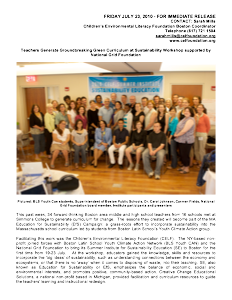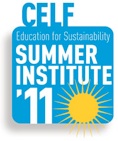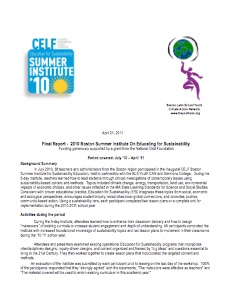Summer Sustainability Institute for Educators




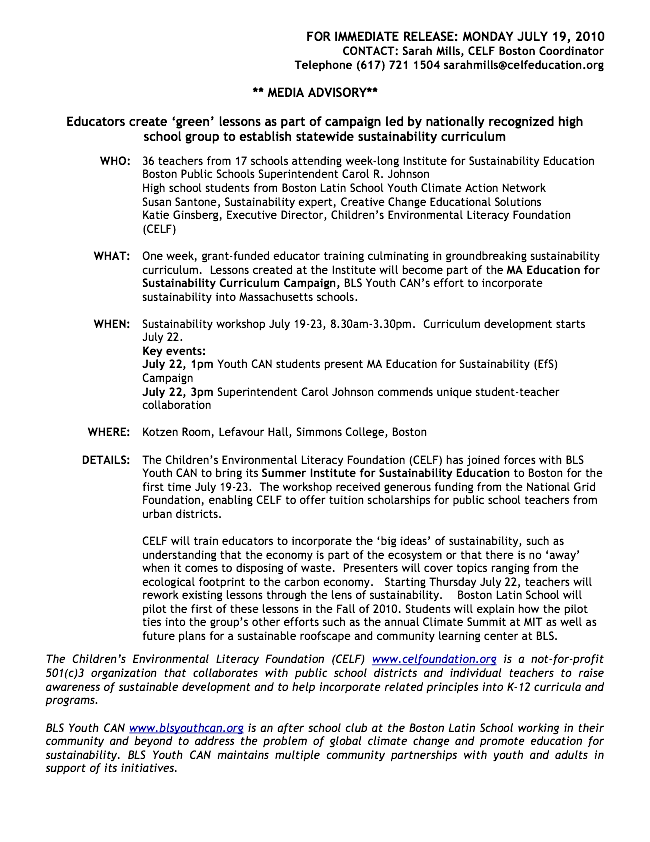
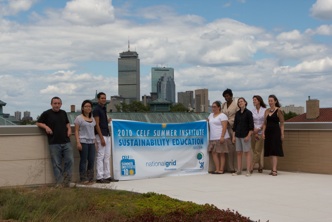


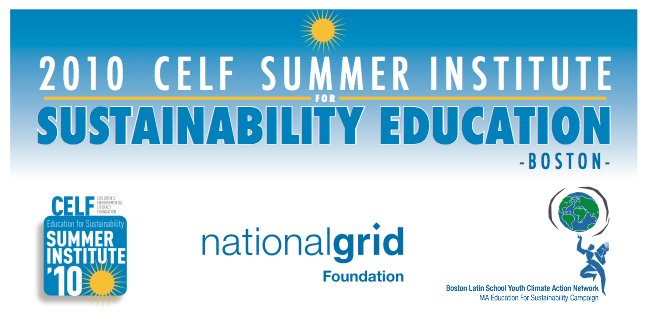
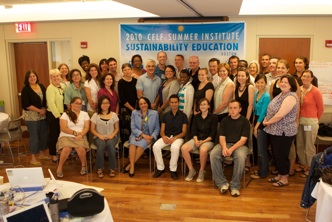

The Children’s Environmental Literacy Foundation
July 19 – 23, 2010
8:30 am – 3:30 pm
Hosted by Simmons College School of Education, Boston, MA
DAY 1: EDUCATION FOR SUSTAINABILITY: ORIGINS AND PRINCIPLES
Morning Session
8:30 Welcome/Introductions/Workshop Overview
9:00 Establishing the Context: What really matters? What supports our well-being?
•Introduction to “The Commons”: ecological/human created resources and relationships that support human needs
•Where are we headed? Overview of global and national trends
Activities: exploration of foundation concepts (systems, interdependence, community)
10:15 Break
10:30 Continue activities
12:00LUNCH BREAK – Registration for Simmons graduate credits [cost $300 payable to ‘Simmons College’]
Afternoon Session
1:00Ecological Footprint: a framework for understanding sustainability
•Human-environmental interactions
•Life cycles/input-outputs
•Land use types and ecosystem services
•Sustainability vs. overshoot; regeneration
3:00 Reflection and Sharing
3:15Needs/suggestions for Day 2
DAY 2: EDUCATION FOR SUSTAINABILITY: REAL WORLD APPLICATIONS
Morning Session
8:30 Sign in/Connections/Review Agenda
9:00 Commons and Policies
10.30 Breakout sessions. Select one:
a) Creating Curriculum for the Outdoors
Jane Hirschi, Executive Director, CitySprouts
Lisa Scolaro, Science Curriculum Coordinator, Cambridge Public Schools
Non-profit organization CitySprouts works with schools to develop school gardens, find curriculum connections and inspire teachers, students and the community to form a deep, hands-on connection to the food cycle, sustainable agriculture and the natural environment. Since 2000, CitySprouts has been working with the Cambridge Public Schools to create a thriving, district-wide school garden program serving over 4,000 urban students. In this session, CitySprouts Executive Director Jane Hirschi and Cambridge Public Schools Science Coordinator, Lisa Scolaro will share their experiences of developing inquiry-based science units using school gardens and training teachers in their implementation. Participants will work in small groups to begin developing outdoor connections with their own teaching practice.
OR
b) Carbon Market 101
Lisa Hodes, Director US markets, Gold Standard Foundation
Though well-established in Europe, the carbon economy is a relatively new concept for US customers. New policies, increased consumer awareness, and the work of those such as Gold Standard’s Director of US markets, Lisa Hodes, are set to change this. The Gold Standard Foundation is a Swiss-based non-profit organization providing carbon credit certification for sale for both compliance and voluntary offset markets. It verifies carbon reduction projects and ensures that they make a measureable impact on sustainable and social development in local communities. Lisa will describe her career path and current role certifying renewable energy and energy efficiency projects, and will provide an overview of the challenges and opportunities of the burgeoning carbon market.
12:00LUNCH BREAK
Afternoon Session
1:00Global vs. regional footprint; global population and equity issues.
Activities to demonstrate connections between science, economics, equity and civics topics
2:00Ideologies and sustainability
3:15Needs/suggestions for Day 2
DAY 3: CURRICULUM ACTION FOR SUSTAINABILITY
Morning Session
8:30 Connections/Review Agenda
8:45 Goal setting for curriculum integration and identification of methods
•Integration approach (unit/course makeover? New insert unit? Curriculum mapping/identifying “big picture” integration points)
•Desired outcomes for students
10:15 Break
10:25 Breakout Sessions. Select one:
a) Black, Green, or Somewhere in Between:
Using China as a Case Study for Understanding Global Environmental Issues
Lina Yamashita, Program Coordinator, Primary Source
This workshop examines China’s complex record with regards to sustainability. On the one hand, China continues to suffer from serious environmental problems, but on the other hand, China is leading the way in making clean, green energy. Through images, videos, and small- and large-group discussions and activities, teachers will explore the implications of this paradox, both for China and the world, consider questions that it raises, and learn about ways that the world can move forward in achieving sustainability. Teachers will also learn strategies and activities that they can use to incorporate this content into their teaching.
OR
b) Life Cycle Assessment: Designing Green
Grant Kristofek, President, Kristofek Engineering & Design Consulting Group
Life Cycle Assessment (LCA) is a tool to measure the environmental impact of a product or process throughout the entirety of its life, from creation to disposal, or ‘cradle’ to ‘grave’. Grant Kristofek is a MIT-trained mechanical engineer who specializes in using LCA to promote a more sustainable ‘cradle-to-cradle’ approach to design, reducing waste and damage to the environment and/or human health. Grant will outline the concept and relevance of LCA, introducing key stakeholders and their roles within the design process. He will highlight common negative health/environmental impacts of consumer goods and services and show how the LCA can be used to identify and mitigate these. Armed with this knowledge, educators will work in groups to design their own sustainable products.
12:00LUNCH BREAK
Afternoon Session
1:00Resource Exploration, Unit Planning mini-session, or Curriculum Mapping mini-session
•Computer lab time to explore resources OR
•Unit design and Big Ideas: the process and details OR
•Curriculum mapping; identifying insertion points
2:30 Cate Arnold Faculty Advisor, BLS Youth CAN: Review of EfS Curriculum Development Guidelines for Inclusion in EfS Curriculum Pilot
3:00Curriculum check-in: What is my approach? What do I hope to accomplish by Friday? What will I continue beyond this?
* Reminder to Bring Bag Lunch for Thursday
DAY 4: GUIDED CURRICULUM DEVELOPMENT
8:30 Connections/Review Agenda
10:00Continue guided curriculum work
12:00 LUNCH BREAK
OPTIONAL: Youth Activism Multimedia Presentation by Alan Palm, Alliance for Climate Education followed by presentation from BLS Youth CAN students
1:00BLS Youth CAN Students Presenting About the Youth CAN EfS Campaign
Robert Keller, President, National Grid Foundation – on funding and promoting EfS
1:30 Continue curriculum work
DAY 5: INDIVIDUAL WORK AND PEER MENTORING
Morning Session
8:30 Sign in/connections
9:00Tour of Green Roof on Simmons School of Management by Steve Gusmini, Director of Building and Grounds
10:00Work session implementation. Access available to computers, curriculum resources.
Activities: Participants work individually or in pairs/teams on their curriculum
12:00 LUNCH BREAK
Afternoon Session
12:45 Work sessions wrap‐up
1:30Participants’ presentations of their work
Share and discuss completed unit makeovers and teaching strategies.
Activities to assess factors influencing teaching (parents, standards, community culture, etc.); identify barriers and opportunities based on these influences; and generate strategies or personal goals for maximizing the opportunities. Identify on-going support needed from peers and CELF.
3:00Wrap‐up/Evaluation
The Boston CELF Summer Institute was generously supported by National Grid.


Registration is now open for the 2011 Summer Institute, 7/11 - 7/13 at Boston Latin School. Click to the left to register.
Click above to download the Final Report for the 2010 Summer Institute.



